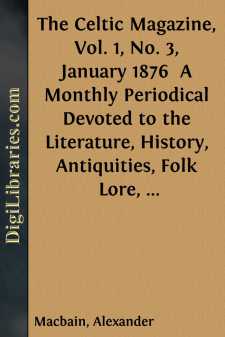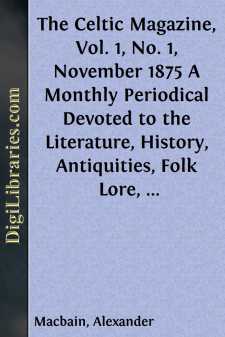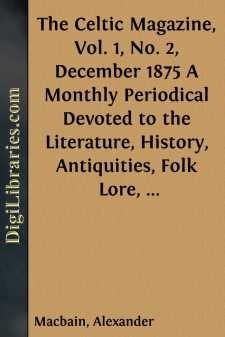Categories
- Antiques & Collectibles 13
- Architecture 36
- Art 48
- Bibles 22
- Biography & Autobiography 813
- Body, Mind & Spirit 142
- Business & Economics 28
- Children's Books 14
- Children's Fiction 11
- Computers 4
- Cooking 94
- Crafts & Hobbies 4
- Drama 346
- Education 46
- Family & Relationships 57
- Fiction 11829
- Games 19
- Gardening 17
- Health & Fitness 34
- History 1377
- House & Home 1
- Humor 147
- Juvenile Fiction 1873
- Juvenile Nonfiction 202
- Language Arts & Disciplines 88
- Law 16
- Literary Collections 686
- Literary Criticism 179
- Mathematics 13
- Medical 41
- Music 40
- Nature 179
- Non-Classifiable 1768
- Performing Arts 7
- Periodicals 1453
- Philosophy 64
- Photography 2
- Poetry 896
- Political Science 203
- Psychology 42
- Reference 154
- Religion 513
- Science 126
- Self-Help 84
- Social Science 81
- Sports & Recreation 34
- Study Aids 3
- Technology & Engineering 59
- Transportation 23
- Travel 463
- True Crime 29
The Celtic Magazine, Vol. 1, No. 3, January 1876 A Monthly Periodical Devoted to the Literature, History, Antiquities, Folk Lore, Traditions, and the Social and Material Interests of the Celt at Home and Abroad
Categories:
Description:
Excerpt
THE STATE OF THE OSSIANIC CONTROVERSY.
[Continued.]
Mr Arnold in that handsome, but slightly ambiguous admission of his, that the Celts in their intellectual capacity come very near the secret of nature and of natural magic, does not seem to imply more in reality than that they have a subtler sense of certain natural affinities than their Anglo-Saxon brethren have; that they apprehend more surely when, where, and how the truest impress of physical nature occurs on the percipient faculties of the soul, than men of a more phlegmatic constitution do; and that they can draw from such intuitions of their own a sort of inspiration, or second-sight of nature, comparable to prophecy, which gives their highest poetic utterance a rapt enthusiasm—and the accuracy of this estimate need not be disputed, but, so far as Ossian is concerned, it must be considerably extended. To read Ossian as we do, from the text of Macpherson, there was another sort of insight, purely scientific, into the mysteries of nature, inherited and expressed by him; a certain acquaintance with her hidden powers, and a certain augury of her possible future development, if men could only attain to it, far beyond the mere rapt enthusiasm of a poet, or the so-called second-sight of a seer. Whether this peculiar faith of his was derived by tradition, and if so, from whom; or whether it was the result of practical experiment in his own generation, is foreign for the moment to our present inquiry. But that it was relied upon as an endowment of the most gifted heroes; that it was exercised by them in extremity, as if to subdue nature from whom they had borrowed it, and to wrest the very power of destruction out of her hand; and that such practical conquest was sometimes achieved by them, or is said to have been achieved by them, is just as certain as that Macpherson's translation is before us now. What we refer to more especially for the present, is the secret of extracting or discharging electricity from the atmosphere by mechanical means—by the thrust of a spear, or of a sword, into the bosom of the low-hanging cloud, or lurid vapour, and so dislodging the imaginary spirit of evil by which they were supposed to be tenanted. Only the very best, and bravest, and wisest could prevail in such conflict with nature; but they did prevail, according to Ossian; and the weapons of their warfare, and the mode of their assault, were precisely similar to what an experimentalist in electricity might employ at the present day, or to what the Egyptians employed in the days of Moses. We shall not now go further back in the prosecution of this inquiry, but would seriously recommend the reader who has any difficulty on the subject to compare, at his leisure, the work of Moses on the top of Mount Sinai and elsewhere, with an Egyptian "rod" in his hand, and the exploits of Fingal in conflict with the Spirit of Loda on the heights of Hoy, with a sword in his hand. There might have been a far-derived and long traditional secret connection between the two, most edifying, or at least most curious, to investigate; or they might both have resulted from that sort of intuition which only the most gifted of any nation enjoy independently, re-appearing again in Franklin, and now familiarised to the world....




